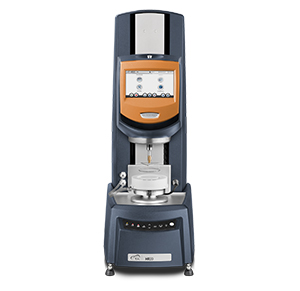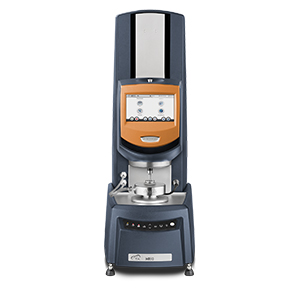View DHR Brochures DHR Accessories Request a Quote
Rheology is the study of flow and deformation of materials under the influence of an external force or stress. The combination of stress, strain and shear behavior forms the basis of rheology, the science of the deformation of materials. Rheology measurements are used to ensure successful material processing, optimize product performance, gain insights into complex microstructures and develop novel materials.
Rheometers are high-precision instruments that measure flow and deformation by applying a force to a sample and measuring the resulting stress or strain, allowing for measurement of viscosity and modulus. With a rheometer, viscosity measurements extend far beyond the limits of a traditional viscometer, characterizing non-Newtonian behaviors like shear thinning, thixotropy, and yield stress of complex fluids (emulsions, suspensions, paints, inks, coatings, slurries). Oscillatory rheology measures viscoelasticity (Storage Modulus, Loss Modulus, Tan Delta) of materials ranging from low-viscosity fluids to stiff solids in DMA mode (Dynamic Mechanical Analysis).
The new TA Instruments | Waters Discovery Hybrid Rheometer delivers superior performance, ease of use and versatility. Whether rheological measurements require controlled stress, strain or rate; steady shear or oscillation; rotational, tensile, compressive or extensional deformation; the DHR is the instrument of choice across leading labs around the world.
Performance: Accurate, precise rheology data starts with the fundamental measurements of Torque (stress) and Displacement (strain). The Discovery HR’s industry-leading torque sensitivity is a result of the patented Magnetic Bearing, decreasing friction by >70% (vs. air bearings), enabling accurate low-stress measurements such as yield stress and zero-shear viscosity. Thanks to the patented Optical Encoder Dual Reader, the Discovery HR provides industry-leading displacement resolution for the most precise measurements of shear rate and small amplitude oscillatory strain.
Ease of Use: The new Discovery Hybrid Rheometer is designed to enable every operator to get the most accurate rheology data. User-centric features such as integrated sample lighting and an intuitive touchscreen make sample loading easy and repeatable. Test methods are streamlined in TRIOS Express software for routine testing, and complete customization is available in TRIOS Unlimited for advanced characterization.
Versatility: With the Discovery HR’s extensive portfolio of rheology accessories, the rheometer can be configured for a wide range of experimental needs. SmartSwapTM geometries and accessories are installed in seconds and automatically identified, perfect for labs supporting a growing range of materials and testing requirements. Glovebox operation of TA Instruments Discovery Hybrid Rheometers provides reliable material data of atmosphere sensitive samples. Learn more about the Discovery Hybrid Rheometer Accessories.
Common Testing Standards
- ASTM D4092 – Standard Terminology for Plastics: Dynamic Mechanical Properties
- ASTM D4440 – Standard Test Method for Plastics: Dynamic Mechanical Properties Melt Rheology
- ASTM D4473 – Standard Test Method for Plastics: Dynamic Mechanical Properties: Cure Behavior
- ASTM D5279 – Standard Test Method for Plastics: Dynamic Mechanical Properties: In Torsion
Discovery Hybrid Rheometer Instruments
Application Notes
- Rheological Evaluation of Battery Slurries with Different Graphite Particle Size and Shape
- Powder Rheology of Graphite: Characterization of Natural and Synthetic Graphite for Battery Anode Slurries
- Powder Rheology of Lactose: Impacts of powder morphology on performance of pharmaceutical excipients
- Characterization of UV Curing resins for Photo-Curing 3D Printing
- Application of Rheology of Polymers
- Understanding Rheology of Structured Fluids




